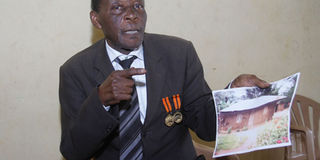Prime
Museveni went against promise he made to me 30 years ago

Ssalongo Ibrahim Luliika carries a photo of his house that was at times used as command centre by the NRA in Luweero District. PHOTO BY ABUBAKER LUBOWA
What you need to know:
- Long wait. Ssalongo Ibrahim Luliika, a former security operative in the Idi Amin government, met NRA leader Yoweri Museveni at his banana plantation in Luweero District at the beginning of the five-year Bush War. Luliika claims he supplied food to the rebels but, despite being promised, has never been compensated. He told Henry Lubega his story.
- In the letter, Gen Saleh said: “I don’t see why we pay for cows they say we ate in Gulu when we don’t know how many they are and fail to pay this long-time supporter.”
- In another letter, the army approved Shs300,000 as compensation for food got from Luliika’s farm, but Fred Rwigyema’s note on the letter disputed the figure, saying it was little money compared to the food he supplied the rebels.
My name is Ssalongo Ibrahim Luliika from Mugoggo village, Luweero District. I was born in 1943 and started my education in Budee Primary School in Butambala before moving on to Nabagereka Primary from where I completed my primary education.
I then joined Kibuli Junior School and on completing Junior One, I became a radio repair apprentice with a one Jingo at Blue Room on Namirembe Road in Kampala.
It was at Blue Room that I met a police officer who was dating my sister. He initiated me into working with the police. On December 31, 1960, I started my first police training as an informer at Kampala Central Police Station (CPS).
The training was done in three phases from different places – CPS, Kibuli and later Naguru Police College. After training, I was deployed to the Special Branch under the supervision of senior superintendent of police Ssalongo Musoke and superintendent of police Asanansio Kayondo for the first six month.
During the time former president Idi Amin introduced the State Research Bureau, he wanted to disband the Special Branch. I stayed in the Special Branch though our work was so much taken over by State Research. This gave me more time to attend to my farm In Makulubita.
I supplied food to the police force and that caught Amin’s attention. He wanted to come and visit the farm, but unfortunately he was toppled before he could visit. Many of my colleagues who joined State Research committed crimes, causing their arrest when Amin’s regime fell.
During former president Yusuf Lule’s time, I took a break from work until he was replaced by Godfrey Binaisa. After the fall of the Amin regime, I went back to my garden in Makulubita and concentrated on digging, expanding my banana plantation to 40 acres.
After nine months off work, I returned and worked until the 1980 general election. After the announcement of the results, I left office never to return. I returned to my garden where NRA leader Yoweri Museveni met me. He was looking for a place to hide and get food supply.
Museveni hunts for me
In April 1981, Museveni was introduced to Nasanayili Makamba of Mugoggo by Kasalina Mukuma, his daughter. Museveni then was looking for people with forests in which he and his men could hide.
While hiding in Nasanayili’s forest in Bukusu, Museveni was told of a man called Luliika, a government spy. Museveni’s informers warned him about me, telling him I could arrest him and hand him over to government.
However, Museveni insisted on seeing me. Unknowingly, part of his camp was set up in my forest in Mugoggo. By the time Museveni sent for me, he had already been in touch with my wife, although she did not tell me. I later learnt that she feared to tell me because she thought I would arrest him.
To meet Museveni, I went with two chairs. The meeting was in the middle of my banana plantation. Museveni came with Fred Rwigyema (RIP) and a one Aziz who used to transport him on a scooter.
Museveni said he had heard about me and wanted us to work together. I did not agree immediately. I told him to work with my wives for the time being because at the time I was known to be working for the government.
The NRA leader then told me he wanted food for his men and also asked me to find him trustworthy people to join him. He also wanted me to find people who would support him. I fulfilled whatever he asked me to do. About food, I told him “you have seen my banana plantation”.
We met in between two stems; one of Musakala and the other of Muvubo. Museveni pointed to the Musakala saying it was his favourite. He asked that whenever I was sending him matooke I send him that one. From then on, I sent him 50 bunches every week.
Museveni also told me that whenever I had any information I should deliver it through [Eriya] Kategaya, [David] Tinyefuza, aka Sejusa, or Fred Rwigyema.
From then onwards, my house became Museveni’s meeting point. He would come during the day to meet the different groups. War plans were drawn from my house. Other war suppliers like Fred Sebyala met him at my house. The day Sebyala visited he donated Shs100,000 while his wife gave in Shs50,000. The money was to buy posho to supplement the bananas from my garden.
On top of the money, he also supplied the fighters with sacks of posho, giving them 10 every week. He also met Ignatius Koomu who illegally got posho and beans from Ndejjee SS for the rebels. Besides looking for supplies, we also recruited a number of children to join the forces.
Reception centre
Besides my home being a meeting point for drawing their plans, it also acted as a reception centre for new comers who were on their way to the bush. Personally, I went in to the military camp less than three times. On one of the occasions I had taken journalist William Pike to meet Museveni.
Our home was also a sickbay and a resting place. The first victim to come home was Rwigyema. My wife had to move from her bedroom for six weeks to nurse him.
After Rwigyema was now Gen Elly Tumwine. During his first three days in my house, he could not go out. Then Mugisha Muntu too was brought after he was shot in an ambush at Kasalita. He spent two days at my place as they organised transport to take him to Kampala. He had a hole around his lungs and my wife nursed him.
Other commanders like [now Rwandan president Paul] Kagame, Tinyefuza, [Mag Gen Matayo] Kyaligonza and others always came to have a rest at my home.
Disappointment
What disappoints me and those I introduced to Museveni is that we have totally been forgotten and the promises of paying for our food and other things they used have not been fulfilled. Those in offices have gone ahead to forge invoices that they have paid us.
People working in offices may not know our contribution and sacrifice, but even those who sought sanctuary in my house have forgotten me. It was only Rwigyema who was helpful before he died. If he was still alive, I would have followed him to Rwanda.
Back here, it’s only Salim Saleh who remembers me whenever I get a chance to see him. But not even the President or his staff, save for Lucy Nakyobe, who once in a while comes to my aid.
I am disappointed that the President forgot what he promised when we met in the banana plantation to pay for the food after the war. More than 30 years since the first supply of food, I am still waiting for payments.
Unfortunately, those who were not in the war have turned out to be war claimants. Some have turned it into a business while the genuine ones are denied access to what is due us.
Letter from Gen Salim Saleh
In a December 1986 letter seen by Sunday Monitor, Gen Salim Saleh directed the army to have Ssalongo Ibrahim Luliika compensated.
In the letter, Gen Saleh said: “I don’t see why we pay for cows they say we ate in Gulu when we don’t know how many they are and fail to pay this long-time supporter.”
In another letter, the army approved Shs300,000 as compensation for food got from Luliika’s farm, but Fred Rwigyema’s note on the letter disputed the figure, saying it was little money compared to the food he supplied the rebels.
Unfortunately for Luliika, Rwigyema left office before having his paperwork completed.




